| Listing 1 - 10 of 21 | << page >> |
Sort by
|
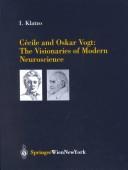
ISBN: 3211837981 Year: 2002 Publisher: Wien : Springer,
Abstract | Keywords | Export | Availability | Bookmark
 Loading...
Loading...Choose an application
- Reference Manager
- EndNote
- RefWorks (Direct export to RefWorks)
Neurosciences --- Neuroscientists --- History.
Book
ISBN: 9780199875924 9781280685767 9780199734344 0199875928 128068576X 0199734348 0190255862 Year: 2012 Publisher: New York Oxford University Press
Abstract | Keywords | Export | Availability | Bookmark
 Loading...
Loading...Choose an application
- Reference Manager
- EndNote
- RefWorks (Direct export to RefWorks)
Another Day in the Monkey's Brain charts a neuroscientist's journey to understand the central mysteries of consciousness. Dr. Siegel began his career in the neurophysiology of vision in the 1980s, just when the field was coming into focus with the advent of new computing and imaging technologies. As a pioneer in the technique of mesoscopic imaging, he worked with some of the giants in vision science: Torsten Wiesel, Francis Crick, Tom Albright and manyothers. With insight and clarity, he shows how science is built on such relationships. Along the way, he gives a vivid sense of the abundant passion and creativity that drive scientists in their pursuit of understanding. From monkey to man, Dr. Siegel finds the beauty in the scientific discovery of self in mindand brain.
Neurophysiologists --- Neuroscientists --- Physiologists --- Siegel, Ralph Mitchell,
Book
ISBN: 022800019X 0228000203 9780228000204 9780228000198 0773559280 9780773559288 9780773559288 Year: 2020 Publisher: Montreal Kingston London Chicago
Abstract | Keywords | Export | Availability | Bookmark
 Loading...
Loading...Choose an application
- Reference Manager
- EndNote
- RefWorks (Direct export to RefWorks)
"Wilder Penfield (1891-1976) is famous for his contributions to the understanding of epilepsy and for his discoveries of the relationship between the structure and function of the human brain. His operations, which involved stimulating the cerebral cortex of awake patients with a fine electrode, assured the complete removal of lesions that caused epilepsy. Less widely known is his use of the same technique to localize the interpretation of language, the recording of memories, and the ability to interpret the present in light of past experience. Radical Treatment follows the evolution of Penfield's thinking from his description of brain scars at the beginning of his career to his last thoughts on the human condition. Through a review of his clinical charts, intraoperative sketches, manuscript notes, and other archival material held at the Montreal Neurological Institute and Hospital, this book presents a fascinating narrative of the development of Penfield's career and the processes that led to each of his great discoveries. Richard Leblanc vividly conveys the collaborative nature of Penfield's work at the Royal Victoria Hospital and at MNI, which led to his greatest discoveries. Revealing the duality of a life in science, Leblanc shows that while Penfield was instrumental in establishing the localization of specific functions to distinct regions of the brain, he concurrently stressed the integrative action of the nervous system. Written by the leading authority on the history of Penfield's Montreal Neurological Institute, Radical Treatment is an insightful account of the scientific accomplishments of one of the twentieth century's most influential neuroscientists."--
Neuroscientists --- Neurosurgeons --- Neurosciences. --- Nervous system --- Neurosciences --- Surgery. --- Philosophy. --- Penfield, Wilder,
Film

ISBN: 9786317679368 6317679363 Year: 2019 Publisher: Santa Monica, California Lionsgate
Abstract | Keywords | Export | Availability | Bookmark
 Loading...
Loading...Choose an application
- Reference Manager
- EndNote
- RefWorks (Direct export to RefWorks)
The very laws of science are called into question when William Foster, a neuroscientist, seeks to bring back his dead family members. A car accident takes everyone he loves from him, but the synthetic biologist decides to put all of his scientific knowledge to the test when his grief overwhelms him. If Foster wants to be successful though, he'll have to take on not only scientific experimentation, but a government task force out to stop him.
Neuroscientists --- Cloning --- Consciousness --- Scientists --- Families --- Dead --- Human cloning
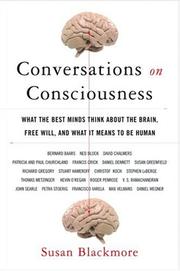
ISBN: 0195179587 9780195179583 9780195179590 0195179595 Year: 2006 Publisher: Oxford ; Oxford University Press
Abstract | Keywords | Export | Availability | Bookmark
 Loading...
Loading...Choose an application
- Reference Manager
- EndNote
- RefWorks (Direct export to RefWorks)
In Conversations on Consciousness, Susan Blackmore interviews some of the great minds of our time, a who's who of eminent thinkers, all of whom have devoted much of their lives to understanding the concept of consciousness. The interviewees, ranging from major philosophers to renowned scientists, talk candidly with Blackmore about some of the key philosophical issues confronting us in a series of conversations that are revealing, insightful, and stimulating. They ruminate on the nature of consciousness (is it something apart from the brain?) and discuss if it is even possible to understand the human mind. Some of these thinkers say no, but most believe that we will pierce the mystery surrounding consciousness, and that neuroscience will provide the key. Blackmore goes beyond the issue of consciousness to ask other intriguing questions: Is there free will? (A question which yields many conflicted replies, with most saying yes and no.) If not, how does this effect the way you live your life; and more broadly, how has your work changed the way you live? Paired with an introduction and extensive glossary that provide helpful background information, these provocative conversations illuminate how some of the greatest minds tackle some of the most difficult questions about human nature.
Consciousness --- Neuroscientists --- Philosophers --- Apperception --- Mind and body --- Perception --- Philosophy --- Psychology --- Spirit --- Self --- Life scientists --- Philosophers - Interviews --- Neuroscientists - Interviews
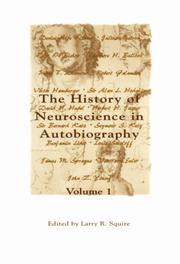
ISBN: 0126603014 0916110516 9786611325503 1281325503 008053404X 9780126603019 9780126603026 0126603022 9780126603057 0126603057 9780126602463 0126602468 9780123705143 0123705142 9780916110512 9780195380101 019538010X 9780195396133 0195396138 9786611038540 1281038547 0080534058 9786610641420 1280641428 0080461913 9786611049904 1281049905 0080534066 9786611049898 1281049891 0080533981 Year: 1996 Publisher: Washington D.C. Society for Neuroscience
Abstract | Keywords | Export | Availability | Bookmark
 Loading...
Loading...Choose an application
- Reference Manager
- EndNote
- RefWorks (Direct export to RefWorks)
This fifth book of autobiographical essays by distinguished senior neuroscientists includes contributions by Samuel H. Barondes, Joseph E. Bogen, Alan Cowey, David R. Curtis, Ennio De Renzi, John S. Edwards, Mitchell Glickstein, Carlton C. Hunt, Lynn T. Landmesser, Rodolfo Llinas, Alan Peters, Martin Raff, Wilfred Rall, Mark R. Rosenzweig, Arnold Bernard Scheibel, and Gerald Westheimer. This collection of fascinating essays should inform and inspire students and working scientists alike. The general reader interested in science may also find the essays absorbing, as they are essentiall
Neuroscientists --- Biography --- Neurosciences --- History --- Neuroscientists - Biography. --- Neuroscientists. --- Neuroscientists --Biography. --- Natural history. --- Science. --- Medicine. --- Life scientists --- Medical sciences. --- Basic medical sciences --- Basic sciences, Medical --- Biomedical sciences --- Health sciences --- Preclinical sciences --- Sciences, Medical --- Life sciences --- Medicine --- Neural sciences --- Neurological sciences --- Neuroscience --- Medical sciences --- Nervous system --- Scientists
Book
ISBN: 1621009807 9781621009801 9781621009436 1621009432 Year: 2012 Publisher: Hauppauge, New York Nova Science Publishers, Inc.
Abstract | Keywords | Export | Availability | Bookmark
 Loading...
Loading...Choose an application
- Reference Manager
- EndNote
- RefWorks (Direct export to RefWorks)
Neurosciences --- Neuroscientists --- Life scientists --- Neural sciences --- Neurological sciences --- Neuroscience --- Medical sciences --- Nervous system --- Research
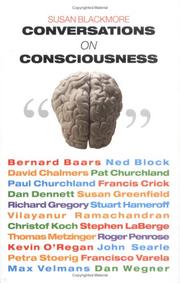
ISBN: 1281341770 9786611341770 0191539627 1423758161 9781423758167 1280762551 9781280762550 9786610762552 6610762554 0192806238 019280622X 9780192806222 9780192806239 0192806238 9780191539626 Year: 2005 Publisher: Oxford Oxford University Press
Abstract | Keywords | Export | Availability | Bookmark
 Loading...
Loading...Choose an application
- Reference Manager
- EndNote
- RefWorks (Direct export to RefWorks)
Blackmore explores the big questions on the nature of brains, minds, and consciousness, through twenty lively and engaging interviews with some of the best-known personalities from the worlds of science and philosophy. - ;A delightful collection of interviews with 20 famous names in the study of consciousness. Sue Blackmore, herself a writer on consciousness, engages in conversation with each of these very different personalities, drawing out their views on the nature of the mind, on how what goes on in the network of neurons in the brain produces our vivid experiences, and whether we have fre
Consciousness. --- Philosophers --- Neuroscientists --- Life scientists --- Apperception --- Mind and body --- Perception --- Philosophy --- Psychology --- Spirit --- Self --- Philosophical anthropology --- Cognitive psychology
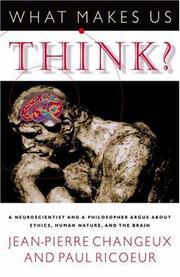
ISBN: 0691009406 0691092850 069123826X Year: 2002 Publisher: Princeton, New Jersey ; Oxford : Princeton University Press,
Abstract | Keywords | Export | Availability | Bookmark
 Loading...
Loading...Choose an application
- Reference Manager
- EndNote
- RefWorks (Direct export to RefWorks)
Will understanding our brains help us to know our minds? Or is there an unbridgeable distance between the work of neuroscience and the workings of human consciousness? In a remarkable exchange between neuroscientist Jean-Pierre Changeux and philosopher Paul Ricoeur, this book explores the vexed territory between these divergent approaches--and comes to a deeper, more complex perspective on human nature. Ranging across diverse traditions, from phrenology to PET scans and from Spinoza to Charles Taylor, What Makes Us Think? revolves around a central issue: the relation between the facts (or "what is") of science and the prescriptions (or "what ought to be") of ethics. Changeux and Ricoeur ask: Will neuroscientific knowledge influence our moral conduct? Is a naturally based ethics possible? Pursuing these questions, they attack key topics at the intersection of philosophy and neuroscience: What are the relations between brain states and psychological experience? Between language and truth? Memory and culture? Behavior and action? What is a mental representation? How does a sign relate to what it signifies? How might subjective experience be constructed rather than discovered? And can biological or cultural evolution be considered progressive? Throughout, Changeux and Ricoeur provide unprecedented insight into what neuroscience can--and cannot--tell us about the nature of human experience. Changeux and Ricoeur bring an unusual depth of engagement and breadth of knowledge to each other's subject. In doing so, they make two often hostile disciplines speak to one another in surprising and instructive ways--and speak with all the subtlety and passion of conversation at its very best.
Ethics --- Neuropsychology --- Neuroscientists --- Philosophers --- Psychology and philosophy --- Changeux, Jean-Pierre --- Ricœur, Paul --- Ethics. --- Neuropsychology. --- Psychology and philosophy.
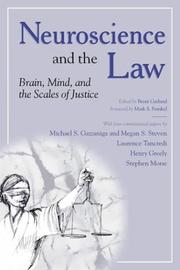
ISBN: 9781932594041 1932594043 Year: 2004 Publisher: New York (N.Y.) : Dana press,
Abstract | Keywords | Export | Availability | Bookmark
 Loading...
Loading...Choose an application
- Reference Manager
- EndNote
- RefWorks (Direct export to RefWorks)
"A report on an invitational meeting convened by the American Association for the Advancement of Science and the Dana Foundation."
Philosophy of science --- General ethics --- Brain --- Neurosciences --- Neuroscientists --- Imaging. --- Research. --- Legal status, laws, etc. --- Neuroscientifiques --- Cerveau --- Droit --- Législation --- Recherche --- Imagerie
| Listing 1 - 10 of 21 | << page >> |
Sort by
|

 Search
Search Feedback
Feedback About UniCat
About UniCat  Help
Help News
News